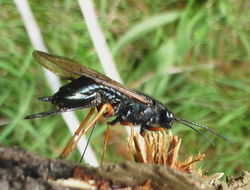Difference between revisions of "Sirex (genus)"
| Line 4: | Line 4: | ||
<font color="#800000">'''''Sirex'''''</font> Linnaeus, 1761 | <font color="#800000">'''''Sirex'''''</font> Linnaeus, 1761 | ||
| − | The genus includes around 15 species of wood boring wasps which are | + | The genus includes around 15 species of wood boring wasps which are found in temperate regions of the northern hemisphere. ''[[Sirex noctilio]]'' is native to Eurasia and northern Africa. It has been introduced into various other regions. |
The female injects eggs, one at a time, into the wood of conifer trees, together with an endosymbiotic fungus of the genus ''[[Amylostereum (genus)|Amylostereum]]''. The fungus is transported in a special structure, the mycangium. It helps the digestion of the wood and provides other nutrients to the ''Sirex'' larvae. Typically each ''Sirex'' species specializes on a single genus of host trees. | The female injects eggs, one at a time, into the wood of conifer trees, together with an endosymbiotic fungus of the genus ''[[Amylostereum (genus)|Amylostereum]]''. The fungus is transported in a special structure, the mycangium. It helps the digestion of the wood and provides other nutrients to the ''Sirex'' larvae. Typically each ''Sirex'' species specializes on a single genus of host trees. | ||
Revision as of 10:39, 20 May 2017
| Literature database |
|---|
| 137 articles sorted by: |
| • year (recent ones first) |
| • research topics |
| • countries/regions |
| • host plants |
Sirex Linnaeus, 1761
The genus includes around 15 species of wood boring wasps which are found in temperate regions of the northern hemisphere. Sirex noctilio is native to Eurasia and northern Africa. It has been introduced into various other regions.
The female injects eggs, one at a time, into the wood of conifer trees, together with an endosymbiotic fungus of the genus Amylostereum. The fungus is transported in a special structure, the mycangium. It helps the digestion of the wood and provides other nutrients to the Sirex larvae. Typically each Sirex species specializes on a single genus of host trees.
The adults have a black or metallic bluish colour but some parts may be reddish brown. The genus is characterized by the presence of the fore wing vein Cu1.
Type species: Sirex juvencus
The literature database currently contains 137 publications for Sirex (genus). Please note that literature records for genera may not be complete. See box above on left for queries from the literature database.
Currently, the following species have been entered into the system:
